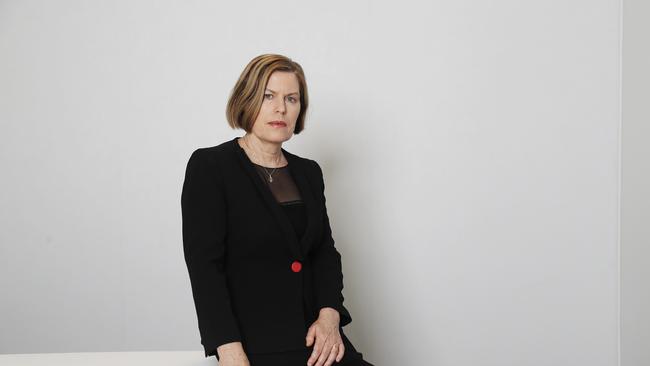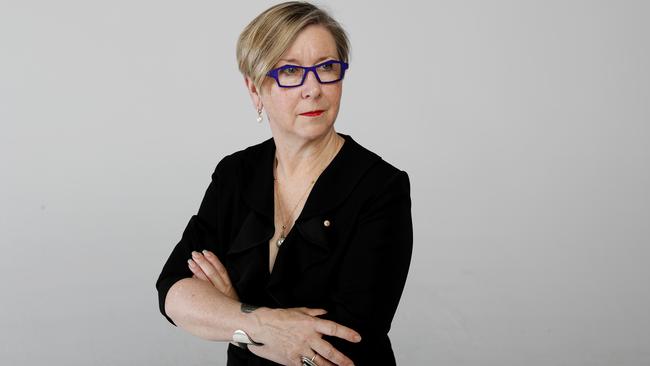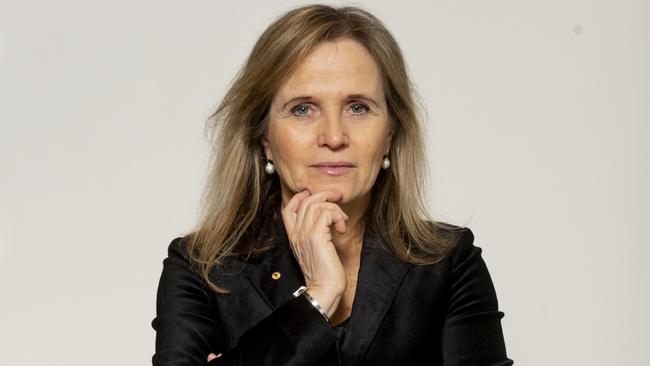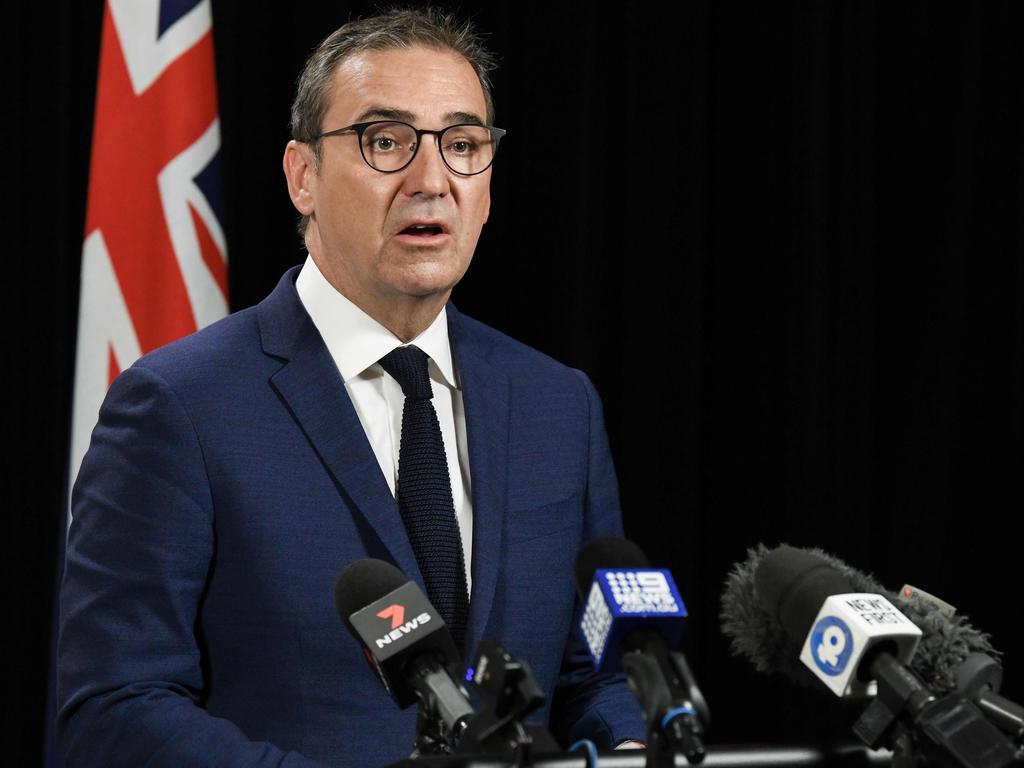Local (health) heroes: the women leading the fight
It took a deadly virus and a devastating pandemic to see the brilliant minds and sheer competence of the women on the virus frontline.

THE DOCTOR
Kerry Chant
Chant is the New South Wales chief health officer.
You’ve been the Chief Health Officer of NSW for a long time. How has your approach to leadership changed during that time and what have you learnt about leadership?
I think leadership is an ongoing journey. You can’t just pick someone’s leadership style and go “oh, I’m going to be like that”. It actually has to gel with your values, and it has to come naturally to you. I think I’m highly motivated, committed to the details. And I’m very clear about having a very strong and capable team, but a diverse team. One of the things I’ve learnt as a leader is that you don’t want to create an environment that just mirrors your skills or your approaches, you actually have to challenge yourself by surrounding yourself with people who will challenge your ideas and present different ideas. And that’s the strength of a truly high-functioning team.
When COVID-19 hit, you received an unprecedented amount of public attention. Do you feel like you’re carrying a heavy load on your shoulders?
I think the gravity of the situation is clear. I’m very thoughtful and bear the weight of any decisions or advice I provide, but there’s been a very strong team behind me. There’s lots of opportunities to critically appraise and calibrate the response. It’s almost like you’ve got to keep looking ahead, you’ve got to manage the now and then keep taking some time to look at what could be on the horizon, looking for risk, looking for opportunities, and then reflecting. I think that’s one of the key things about COVID is we’ve had to learn so quickly. We’ve had to learn and pick up information from the northern hemisphere, learn ourselves and generate that evidence. And being very open to new thinking has been a key component of the response.
How have you managed to keep the public on side?
The response has not just been about controlling COVID, it’s about broader social cohesion. It’s a large behavioural task of working with the community. We’ve had to balance both the economic impacts and the health. And ultimately, that dichotomy is a false dichotomy. Because ultimately, if COVID becomes out of control, the economy is impacted. And in navigating that complex environment, it’s important that you listen, and that you keep your mind open.
The response of NSW to COVID-19 has been lauded, but there have also been setbacks along the way. How do you keep up the morale of your team during the challenging times?
I think it’s important to never become complacent with COVID. While I’m happy that we’ve navigated this path to date, I still remain vigilant and concerned. There obviously will be ups and downs in the response and I think it is about acknowledging the small wins. A lot of the people who have been involved in the risk response from the beginning probably had sufficient insight to know that this was going to be a long, hard slog. This is almost like running a marathon at sprint pace. Because unlike other outbreaks that are wrapped up in eight weeks, or 12 weeks, we know that we’ll be dealing with and responding to COVID for a year or longer.
What did you want to be when you were a child?
I actually didn’t know what I wanted to be. And I think that’s probably okay to say that, because I think many young people struggle with knowing what they want to be. I did do a year of pharmacy before I transferred to medicine. I’ve always been drawn to health and sciences. I grew up in Punchbowl in southwest Sydney. I had many part-time jobs, including at Mr Whippy at Roselands. I worked for Grace Bros in the furniture department, then I worked in a pharmacy. Those jobs taught me respect for money. It was a lot of hard slog standing up all day in those jobs. I think it created a sort of customer service focus. I loved the challenge of working in the pharmacy, I think it actually helped me a lot when I did medicine.
Do you have any hobbies?
I love gardening and I like orchids. I just think they’re such a beautiful plant. I love their diversity, I love the colours, and the intricacies of the veins in the petals. I just find nature particularly amazing. I love looking after my plants and the greenery. I’ve always loved the natural environment.
If there was one thing you could pass on to younger women following in your shoes, what would you tell them?
I say to young women that if you want a senior leadership role, find jobs or teams that you’re working with that you love. I personally can’t conceive of doing a job that requires such levels of commitment if you didn’t genuinely like what you’re doing. I’m not saying you have to like 100 per cent of it, but you have to like the majority of it. And you have to get out of bed every day and know that you’re pleased about your choice. I also think young women need to recognise that there are hard trade offs that you need to make through life. While there is a better work-life balance, there will always be things that counter that. Responsiveness means answering the phone. There are fewer boundaries, emails will come all the time. I think you need to have good social networks, particularly family networks, to support you.
-

THE GLOBALIST
Jane Halton
A former head of the federal departments of health and finance, Halton chairs the Coalition for Epidemic Preparedness Innovation, which leads the hunt for a vaccine.
You were the first woman to head a central government department in the federal public service when you were appointed Secretary of the Department of Finance. Did gender ever represent a barrier to getting to the top?
I was slightly conscious of being the first woman to ever run a commonwealth central agency. But it didn’t define me or it didn’t define how I did the job. Earlier in my career, I’d had a large amount of experience being the only woman in the room. I don’t think I’ve ever seen it as an impediment. I guess I didn’t know there was a glass ceiling until I hit it. But I always had a view that if I just put my head down and did a really, really good job, eventually that would win out, which I think you could argue with that appointment, it did.
Your career has been dedicated to public service, as was your father’s before you. What special leadership qualities does public service demand?
I was really interested in the notion of a contribution to our country. I thought about being an academic, but I thought it was too boring. When I joined the public sector I had a very longstanding interest in data and the proper use of data, to drive policy and to inform how we run our country. So I joined the Australian Bureau of Statistics. And then I rapidly joined what was then the Department of Social Security, where I worked on older people’s issues, looking at things around dementia, issues around the standard of care for people. Those things for me were real motivators.
As a public servant over so many years you were described as building a fearsome reputation for blunt talk. But how would you describe your style of leadership?
Leadership needs to be authentic. If you put someone else’s mask on, you won’t be authentic. So you have to know who you are. You also have to know your strengths and weaknesses. I am known to be frank, and I could not work any other way. It doesn’t mean that you’re undiplomatic. I think that no one ultimately will thank you if you knew something that ultimately proves to be material and you didn’t say something. Being able to speak with people in a way that is really accessible is a really important skill.
You were appointed chair of the Coalition for Epidemic Preparedness Innovations in 2018. Why have you chosen to devote yourself to public health?
You don’t have my DNA and not want to make a difference and make a contribution. Essentially I was asked by people around the world to take on this role. And that was a privilege and slightly daunting.
You are at the centre of efforts to find a COVID-19 vaccine. Is this the biggest challenge you’ve ever faced?
I think so. Of all the things I’ve done, this has the biggest potential to essentially save the most lives. And I think my team at CEPI are motivated by that. We all know that.
Your husband also had a high-flying career, serving as the nation’s deputy statistician. How have you managed having two highly demanding careers in one marriage?
We were both very lucky that we have a very equal arrangement. We’ve always managed to juggle children, household activities, cooking, etc, etc. And fundamentally, we both have been flexible. And so that’s enabled us to manage, occasionally with some help. But the good thing about our partnership is that it is a true partnership.
You’ve been a mad-keen skier since you were a child. What do you find so addictive about the slopes?
With adrenaline-based sports, you can’t think about anything else. And I think it’s probably also a bit like golf, you can always get better. I love the challenge of improvement, the challenge of literally getting down the slope that’s in front of you, and not being able to think about what’s in your in-tray or what the current crisis is. And I love the opportunity to spend some time in the fresh air with friends. It’s just a fantastic sport.
You’re also heavily into fitness. Is that something that has helped you manage stress in your career?
Absolutely. I think all the evidence is really clear on the advantages of physical fitness. It helps with sleep, it helps with concentration, it gives you stamina. I’m probably blessed with a certain level of natural stamina, but there is no doubt in my mind that maintaining good physical health and fitness has been crucial, particularly those really difficult times just to keep going.
What do you feel you still have left to achieve?
I don’t have achievement targets. For me, achievement continues to be the making of a contribution. I love what I do. And I’m so privileged now to be able to make contributions both in large commercial contexts and to continue my interest in global health, and also to do a few pro bono things in Australia, and work with people who I mentor. What I would aspire to is to be able to continue to make a contribution that people find useful.
-

THE SCIENTIST
Sharon Lewin
Lewin is the director of the Peter Doherty Institute for Infection and Immunity in Melbourne.
‘In the past year, you’ve been really thrown into the public spotlight leading the response at the Doherty Institute to the COVID-19 pandemic. Did you ever imagine you would find yourself in such a key leadership role during a pandemic?
I’ve been very active in pandemic preparedness, and also in other infectious diseases, mainly HIV. Since the Doherty was established in 2014 we’ve had an outbreak of ebola, an outbreak of zika, we’ve had new flu strains, but nothing that really came to our shores. I think the scale of this, the way it’s affected every single person on the planet, every industry and what it’s done to the world, I don’t think any of us could have anticipated. To have lived through something of this scale, I don’t think I could have imagined it.
Does the responsibility of helping to find an effective vaccine for COVID-19, and leading this research to understand and combat the virus weigh heavily on you? How do you manage the expectation?
I think the awareness that this is a pandemic and there is an urgent need for a solution I think weighs heavily on everyone. But I try to emphasise to people and to myself that we are contributing to a bigger effort. There’s not going to be one person who suddenly solves COVID. And therefore all the principles of how you should work, take a break, don’t work 24/7, protect your weekends, all the sorts of things that encourage healthier work; you can’t throw that out the window. I’ve really tried to emphasise that very strongly from the beginning. What we have to do is contribute to the bigger effort, and we have to share the knowledge.
Many of the scientists, physicians, epidemiologists and virologists leading Australia’s pandemic esponse are women. How do you think women are uniquely placed to confront the challenges of a pandemic?
It’s really interesting, a lot of the countries that have done well with COVID-19 have also been led by women — Germany and Japan and New Zealand are some that come to mind. I think women generally have a more inclusive leadership style, and confronting this pandemic needs inclusiveness, teamwork, putting aside competitiveness and ego. There are many men who share those qualities, but probably many more women have them.
Before the pandemic, you were dedicated to studying HIV and ultimately finding a cure for HIV infection. What attracted you to HIV research?
I graduated from medicine in 1986, so it was the peak period of the bad days of HIV. There were no treatments, people were dying, young men were dying. It was complex and interesting medicine, and rapidly evolving science. I trained as a clinician initially and I did a PhD in virology in the early ’90s. I spent a year in Kenya in 1989, working in a small hospital outside Nairobi. And that was really the beginnings of awareness that HIV was very widespread in Africa and it was a global problem. I wanted to do something that had a big global impact.
You still practise as a clinician at the Alfred and Royal Melbourne hospitals. How does this frontline contact with patients keep you grounded?
It’s a real privilege to look after patients. Many of my patients I’ve looked after for decades. It just keeps me focused not only on what matters, but on what questions are important to ask. You can lose touch with that just being in the lab the whole time.
How do you deal with stress? Does the stress of holding so many leadership positions ever overwhelm you?
Not really. I try to keep perspective. I seek help quite a bit. If I’m unsure about things I have no problem talking about it. I’m also quite good at shutting off if I have to, and just going to bed when I’m overwhelmed or if I’m tired or grumpy and just need to turn off.
Are there still gender barriers in science?
Definitely. The numbers don’t stack up that well. There are many, many champions for gender equality in science, but the numbers at the top haven’t really increased that much. Personally, I didn’t experience gender barriers, but I know my situation is quite unique. In some ways I’ve felt being female was an advantage in certain circumstances, I think mainly because people underestimate you.
What did you learn about leadership and success from your parents? What was their biggest lesson to you?
My parents had a very, very strong work ethic. My mother is Polish and my father is Czech. They came as refugees following World War II with essentially nothing and they built up their lives here. They gave me a belief that I could do anything. Another big thing that very much came from my mother was around balance. My mother was really proud of my academic achievements, but for her it was just as important that I socialised, I played sport, I was part of the community. I’m Jewish and we’ve got a very connected community. So there was always that feeling that there was something much bigger than you, and that you’re not alone in the world.
What do you feel you still have left to achieve in your career?
I think when I look at other very successful leaders, one area that I judge others on is who has come up behind them, what does that next generation look like. So I think that’s going to be a big focus for me for the next 10 years or so; where are those next leaders coming from?





